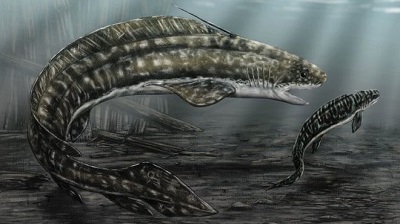Scientists have discovered baby teeth in the fossilised faeces of a prehistoric shark, and concluded that the animals ate their own young.
This rare evidence of “filial cannibalism” was only revealed because the shark’s corkscrew-shaped rectum produced dung in a distinctive spiral, according to BBC.
One such dropping, collected in Canada, holds a tiny tooth of the same species.
These Orthacanthus sharks lived in coastal swamps and may have resorted to cannibalism as they expanded inland.
The macabre sample was gathered by University of Bristol masters student Aodhan Ó Gogáin, now studying for a PhD at Trinity College Dublin, as part of a wider investigation into prehistoric fish on the coast of New Brunswick.
Like much of North America and Europe, this land used to sit near the equator and was thick with tropical jungles.
What was trees and swamps 300 million years ago is now coal-rich rock; the fossils in Mr Ó Gogáin’s study come from the reclaimed site of North America’s oldest coal mine, opened in 1639.
He said the highlight of his research, published in the journal Palaeontology, is definitely the notion of prehistoric cannibal sharks.
“Other people have looked at their diet and found that their stomach contents contained little amphibians,” Mr Ó Gogáin told the BBC.
“And there’s also evidence that these sharks ate other genuses of xenacanth shark. But this is the first bit of evidence we have that they were eating their own young as well.”
The claim for cannibalism rests on two distinctive aspects of Orthacanthus biology.
Firstly, its unusual shape means the fossilised poo, known as a “coprolite”, can be conclusively identified as belonging to one of these large, freshwater sharks.
Secondly, the little tooth that was revealed when the researchers cut into the coprolite is also distinctive.
“These sharks have very distinctive tricuspid teeth, where they have little tusks coming up from the tooth,” said Mr Ó Gogáin. “We’re fairly confident of this discovery.”
The evidence is not unprecedented, he added; modern-day bull sharks, which occupy a similar niche in coastal swamps and shallow seas, have been known to feast on their young when necessary.
“Sharks tend to have a wide dietary range. They’re not really picky eaters.”
H.Z

